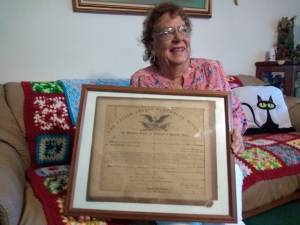Remember finding a coin or arrowhead and wondering if it’s worth anything?
Imagine having a large document signed by Abraham Lincoln, passed down from one generation to the next, and not really knowing its value or its history with the nation’s 16th president.
For now, it has a safe and protected place in the home of 84-year-old Martha M. Fountain, a lifelong resident of Zephyrhills.

(Doug Sanders)
She lives in a community that was founded in 1909 by Capt. Howard B. Jeffries as a retirement colony for Union Civil War Veterans.
A newspaper man himself, Jeffries would not have missed the opportunity to write about Martha.
She has been the artifact’s owner since her husband’s death in 2016.
Married for 31 years to Guy Joseph Fountain Jr., Martha remembers the document hanging in her husband’s office of the Best Way Electric Company in Dade City.
“I’m not much into history,” Martha explained during a recent interview in her home, with her caregiver at her side. “I don’t know much about my husband’s family history,” she added.
Following six months of research with several military websites and The History Center at the Pioneer Florida Museum and Village north of Dade City, the remarkable life of the man named on the Lincoln document begins to emerge.
It turns out Guy Fountain had a great-great uncle named Samuel Warren Fountain.
He was only 15-years-old at the outbreak of the American Civil War on April 12, 1861.
Samuel had to wait until 1864 before joining an infantry of the 8th Corps of the Army of West Virginia, which became famous for having future U.S. presidents Rutherford B. Hayes and William McKinley serving in its ranks.

(Robert Massey)
Samuel Fountain graduated from West Point on June 15, 1870, four months before the death of Confederate Gen. Robert E. Lee in Lexington, Virginia.
Commissioned a Second Lieutenant in the 8th U.S. Cavalry, he was active for the next 20 years in military campaigns against Geronimo and Sitting Bull.
He once described a skirmish in New Mexico as “rough country where horses cannot go.”
During the Spanish-American War, Samuel Fountain served first commanding a squadron of the 8th Cavalry in Cuba.
As Adjutant General in the Philippine Islands, a captain on his staff was John J. “Black Jack” Pershing, who later served as the commander of the American Expeditionary Force on the Western Front during World War I.
In 1904, when Fountain was a lieutenant colonel, he was put in charge of security at the St. Louis World’s Fair.
According to the Arlington National Cemetery website, a local newspaper reported this:
“Under his direction the members of the guard controlled the great mass of people…and on the last day of the Fair, when disorder and vandalism were feared, every officer and member of the guard was on duty, and so placed that when the lights were out and the World’s Fair at St. Louis had passed into history, not a disorderly act had occurred, or a dollar’s worth of property had been destroyed.”
Ironically, Geronimo was also at the fair as a living exhibit intended as a “monument to the progress of civilization.” Under guard, he made bows and arrows while Pueblo women seated beside him pounded corn and made pottery. Geronimo also sold autographs and posed for pictures.

(Doug Sanders)
Samuel Fountain was a brigadier general a year before the Lincoln Memorial was dedicated in the nation’s capital. He gave a speech about Abraham Lincoln during his appearance before the Union League Club of Philadelphia on February 9, 1921:
“Other men have reunited a divided nation, or liberated an enslaved race, or carried to conclusion a fratricidal war, or swept immoral institutions from the earth by consummate Statesmanship; but no man ever combined and carried through, chiefly by the clarity of his mind and the purity of his character, several such gigantic enterprises in half a decade.”
Samuel Fountain died on Nov. 15, 1930, five months after the birth of Guy Fountain, and six years before the death of Capt. Howard Jeffries in New York City on March 20, 1936.
Martha Fountain recalls turning down an offer to sell the Lincoln document still in her possession.
But, with no children, she is undecided about its future.
At this point, she’s not sure what she will do with it. Before doing anything, she plans to consult her lawyer, John Council.
Council has had his own brush with preserving history, having a law office in Dade City at the historic red brick jailhouse, where the last legal hanging in Pasco County was carried out on Jan. 4, 1918.